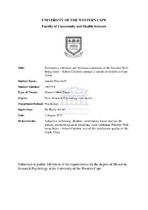Preliminary validation and Afrikaans translation of the personal well-being index – school children amongst a sample of children in Cape Town
Abstract
The construct of subjective well-being within child well-being and quality of life research has become increasingly prominent in recent years. Central to such developments is the question of to what extent children’s subjective experiences of well-being can be compared cross-culturally. Given the paucity of empirical research on the topic of cross-cultural comparisons, the importance of validating current measures of subjective well-being has been emphasized by many researchers as critical in contributing to the international dialogue. The aim of the current study was to test a measure of subjective well-being (the Personal Well-being Index – School Children) amongst a sample of children from Cape Town, Western Cape Province, South Africa. Given the diversity of experience between children from different language groups in South Africa, the study further aimed to determine the extent to which the measures are comparable across two language groups (Afrikaans and English). Data from the Children’s World Survey were used; and include a sample of 1004 children randomly selected from 15 schools within the Cape Town Metropole. Located within the goodness of fit theoretical framework, confirmatory factor analysis was used to test the overall fit structure and multi-group factor analysis, with Scalar and Metric invariance constraints. The results show appropriate fit structure for the overall model, with Scalar and Metric factor invariance tenable across language groups. The overall findings suggest that the Personal Well-being Index – School Children is appropriate for use with English and Afrikaans children in Western Cape Province, South Africa, and that scores between these groups can be compared by regressions, correlations, and means.

